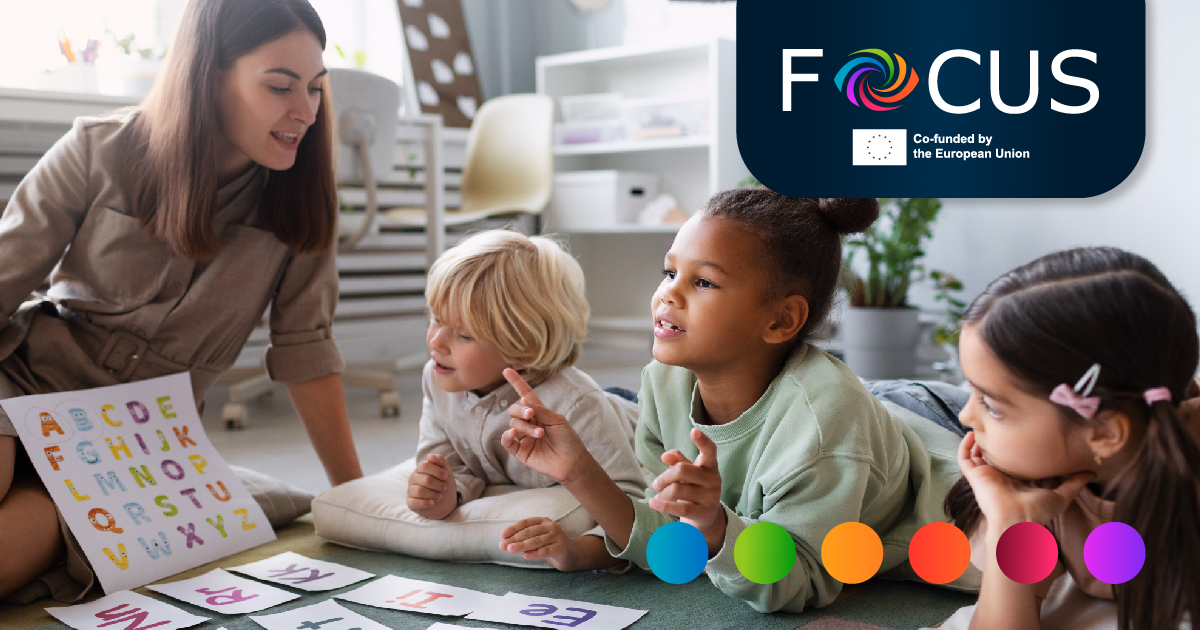In the landscape of European education, our Erasmus+ FOCUS project—Foreign Language Learning Opportunities for Children with Learning Difficulties—is aimed at fostering inclusive and supportive foreign language learning environments for children aged 6 to 12. The project addresses a pressing need: how to effectively support students with learning difficulties in acquiring a foreign language, ensuring they are not left behind in the multilingual European classroom.
Our project empowers educators through innovative, research-based tools and methodologies designed specifically for inclusive foreign language teaching.
Our mission is twofold:
- To equip teachers with effective strategies, tools and professional development opportunities to teach foreign languages to children with diverse learning needs.
- To create engaging and accessible learning environments that promote participation, motivation, and success for every learner, regardless of their challenges.
Our First Milestone: FOCUS in Practice – Digital Database
One of the project’s first tangible results is the launch of the “FOCUS in Practice” Digital Database – a comprehensive online repository filled with best practices, case studies, and interviews with professionals working in foreign language education and special needs education.
This free, open-access resource is available on the official project website and serves as a powerful tool for teachers, speech therapists, educational support staff, and policymakers looking to enhance inclusive teaching in multilingual contexts.
Highlights from the Digital Database
Our “Best Practices” section provides a rich array of approaches that can be implemented in foreign language classrooms. These practices are categorized across key themes such as:
- Vocabulary development and reading fluency
- Spoken language and grammar exercises
- Use of assistive technology and multi-sensory methods
- Classroom management and motivation
- Attention to cultural background and behavioral patterns
- Tools tailored for learners with dyslexia or hearing impairments
Examples of resources include:
- Mind Mapping for Vocabulary Learning
- Storytelling Approaches for Students with Learning Disabilities
- Multisensory Language Games
- Digital English Task Banks for Dyslexic Learners
- Speech and Language Strategies from Specialist Guides
Each entry includes detailed descriptions of the method, its benefits, and practical implementation steps.
Our “Case Studies” section brings theory to life through real stories from classrooms in the six partner countries. These narratives describe how teachers adapted their lessons to support students with specific challenges—from dyslexia and language delay to autism and speech-language impairments.
Some highlights include:
- The use of story cubes and flashcards to support children with expressive language disorders
- A case involving theatre-based learning to build confidence and oral skills in a student with autism
- Implementation of gamified vocabulary apps to engage students with attention difficulties
- Peer-to-peer teaching methods to encourage social inclusion among diverse learners
Each case provides background on the learner, the strategy used, observed outcomes, and practical reflections from the teacher. These firsthand experiences offer valuable insights into the creative and compassionate ways educators are supporting all learners in their classrooms.
Our Interviews section features conversations with educators, speech therapists, and occupational therapists. Their reflections reveal both the challenges and the joy of creating inclusive foreign language learning environments. Topics include:
- Building trust and motivation in students with low self-esteem
- The role of classroom routines in supporting learners with executive function challenges
- Strategies for engaging families in the language learning process
- Tailoring expectations and celebrating small wins
The interviews offer encouragement and guidance, especially to those just beginning their journey into inclusive education.
Empowering teachers and enriching learning
“FOCUS in Practice” Digital Database is more than just a collection of materials—it is a growing community of shared knowledge. It empowers educators to:
- Recognize and respond to individual learner needs
- Apply practical strategies backed by real-life experiences
- Foster classrooms where every child can succeed
Why it matters
Inclusive education is not just about meeting legal obligations—it’s about embracing the diversity of learners and giving each child the chance to thrive. FOCUS project contributes to this goal by creating a shared space for professionals to learn, share and grow.
By offering an extensive toolkit of practices and professional insights, the FOCUS database:
- Helps break down language learning barriers for children with learning difficulties
- Supports teachers in planning differentiated and adaptive lessons
- Fosters a culture of continuous professional development and intercultural exchange
Next steps
As the project evolves, new resources are in development:
- A professional online training course for teachers
- Game-based learning materials for language acquisition
- Customizable teaching toolkits tailored to specific learning difficulties
These outputs will further support teachers in creating inclusive, dynamic, and engaging language classrooms.
Join the conversation on inclusive language education and be part of the change! Stay tuned for our next milestones!

